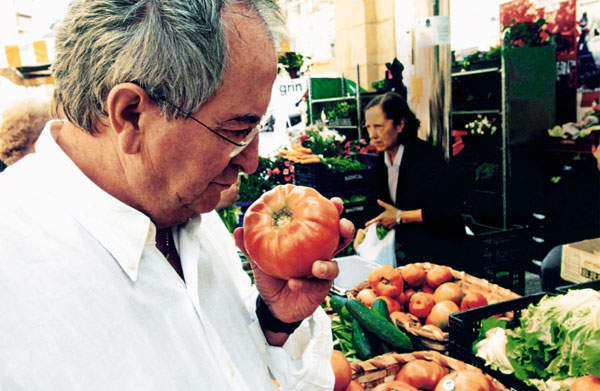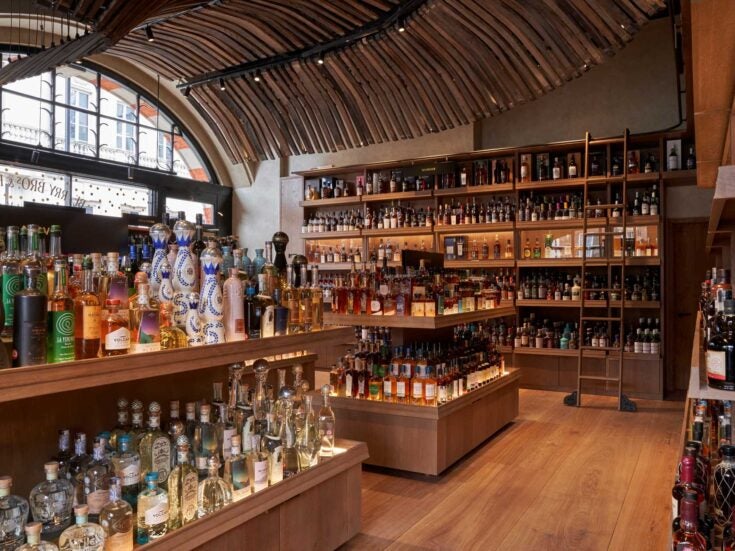

In 1932 an Italian Futurist called Filippo Tommaso Marinetti published a series of recipes in a book called The Futurist Cookbook. Among the dishes was ‘drum roll of colonial fish’. The instructions were as follows: ‘Poached mullet marinated for 24 hours in a sauce of milk, rosolio liqueur, capers and red pepper. Just before serving the fish, open it and stuff it with date jam interspersed with discs of banana and slices of pineapple. It will then be eaten to a continuous rolling of drums.’
Marinetti’s book was part of his eccentric manifesto to have pasta banned — a tough campaign for any Italian. Pasta, he felt, led to pessimism and nostalgic inactivity and made you fat. So he offered his alternative recipes. Perhaps his most triumphant was one sandwiched between ‘Surprise bananas’ and ‘Tyrrhenian seaweed foam’. He called it: ‘Tactile vegetable garden’. Here the salads were eaten ‘by burying the face in the plate, without the help of the hands, so as to inspire a true tasting with direct contact between the flavours and the textures of the green leaves on the skin of the cheeks and the lips.’
The recipe further instructs that as the eater brings his or her head up from the plate, a waiter sprays the face with cologne. And then, before taking another mouthful, ‘the guests must let their fingertips feast uninterruptedly on their neighbour’s pyjamas’. I was thinking of Marinetti during my interview with Spanish chef Juan Mari Arzak. I had quite a lot of time to think. I was in the private dining room of the ludicrously named Ametsa with Arzak Instruction (AWAI), at the Halkin Hotel in Belgravia.
Arzak’s eponymous restaurant in San Sebastián has consistently been in the top ten in polls of the world’s best restaurants; it apparently honours the culinary heritage of the Basque country and when he wins trophies the judges trot out spiel such as Arzak being ‘the first to open a culinary research lab’ and ‘arguably one of the world’s first chefs to adopt a scientific and experimental approach to cooking’.
It is said that he continues to champion techniques that he helped to develop: the likes of freeze-drying, dehydration and distillation.
That’s right. All those nifty things you look for on a chef’s CV when you’re planning a restaurant to go to.
pop-up restaurant
Arzak’s daughter, Elena, is in charge of AWAI. So this restaurant in London is sort of her gaff. Sort of, because it is overseen by her father (hence the name), the only offshoot he has allowed anywhere. And sort of, because from what I can determine this is a consultancy deal between Arzak and the owner of the hotel, Como, which is headquartered in Singapore and owns a string of luxury hotels across the world.
In my research before the meeting I read the following quote from Arzak: ‘What I aim to do: produce an author’s cuisine, with a Basque dimension, green sauce, cod Pil-pil and hake “kokotchas”. In short, combine traditional cuisine with research and make it avant-garde.’ Dishes at the restaurant in San Sebastián include ‘Monkfish and bronzed onion’, ‘Pineapple bubbles’, ‘Moon Stone’ and ‘Bonito tuna in a bonfire of scales and onion’. So you can see why I’m reminded of Marinetti.
And I have time for my thoughts because of how the interview is being conducted. Arzak speaks little English, so I’m conducted into this private dining room — which like the main restaurant has large golden dildos (they say they’re test tubes, but that’s not what everyone thinks of when they see them) protruding from the ceiling — accompanied by a PR, a hotel man who will translate and two other chefs. I ask a question, which is translated, Arzak talks for ages in his squawky Spanish voice, he looks to his two burly chefs for agreement, they both chip in back in Spanish. The other guy then says something else in Spanish, before paraphrasing the text back to me.
Not surprisingly I’d quite like to know exactly what the main man is saying, rather than the agreed quote as trotted out by the suited hotel guy who is translating. So I press him to just tell me what his answers are to my questions. This creates a whole lot more jabbering chat during which time I consider the man and his story thus far.
The restaurant he runs in Spain has been part of his entire life. It was his grandparents’ establishment and then the domain of his mother after his father died in 1951, when he was nine. After military training, an abandoned attempt at being an architect (‘I wasn’t very good at drawing,’ he said) and a course in hotel management, Arzak started work for the family firm, principally in the roasting department.
After taking the reins in the 1980s he developed a more modern and experimental approach, creating some of the aforementioned dishes. But unlike Marinetti, his concept was not a surreal hoax — the dishes were all real. You’re supposed to eat everything. And people did, including the guys from Michelin who gave the place three stars in 1989. Meanwhile, one of my questions returns from doing its rounds through the system. Having opened this place in London with his daughter, what does he thinks of the capital’s dining scene?
This is of course a trick question. I’ve been here before with these chefs. They come to London, spout about how the culinary scene has changed radically over the past couple of decades and how it’s so exciting and diverse a place and this is why they have opened here, or at least agreed to receive the nice fee that comes with the consultancy.‘London has developed a great deal,’ says the suit. ‘Twenty years ago it was not a gourmet destination. Now there are diverse options and it’s a good place to develop concepts.’
No shit, I think. So which restaurants does he like here? I spot a meltdown going on as the guys all panic. University Challenge-type conferring goes on, before the team captain (the suit) tells me: ‘He is a very good friend of Heston Blumenthal.’ Then more conferring and words like Gordon Ramsay, Murano, Pétrus are all offered by the supporting chefs. By the time the answer is proffered I’m moving on to another starter for ten. I wonder how he would define the Basque cuisine for which he is famous. This question is clearly deemed even more devilish. The conversation — with the tedious translation tools removed — goes something like this.
JMA: ‘The food of Arzak is very creative. Everything I do comes from the Basque roots and the DNA of Basque culture. The principle is that it is very traditionally Basque.’
WS: ‘Thank you. I understand that, but what does that mean? What is Basque food? And how is that manifested in your interpretation of it?’
JMA: ‘The world recognises the flavour of Basque cuisine. The ingredients are from the Basque country. It’s a place that has its own culture and its own language. And the best ingredients we use are all local.’
WS: ‘And what are those ingredients? What are these things that define food from the Basque country?’
JMA: ‘The flavours are light. They way food is prepared is balanced. It is something that is very unique.’
WS: ‘OK, but can I ask please what are these dishes and flavours? What are the unique ingredients of the Basque country that defines the traditions of your cooking?’
JMA: (He splutters at this point, and I fear the burly men may drag me out and have me beaten up — or mixed into a plate of ‘Deep blue duck’ or ‘Seabass with vegetable confetti’.) ‘I’ve been describing what it is this entire interview!’
Then he calms and comes back with some more considered thoughts. ‘I need to feel the emotion of all these dishes,’ he says. ‘Cooking for the Basque people is like a religion, it comes from the inside.’
It’s time to leave — in fact I need to go and have lunch and see the food for myself. As I go he shakes me very warmly by the hand and gives me his personal card. ‘The best thing you can do in life is to do every day what you are best at,’ he says. ‘And the best restaurants are the ones that make the least mistakes. Remember, to be creative you need to think like a kid, otherwise you might as well go home.’
Despite our interview palaver, you can’t help but warm to this experimental and humorous man. I can’t wait for lunch.
William Sitwell is the editor of Waitrose Kitchen
comohotels.com/thehalkin/dining/ametsa








